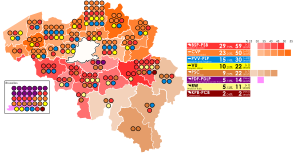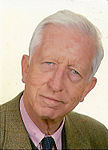General elections were held in Belgium on 10 March 1974.[ 1] Belgian Socialist Party emerged as the largest faction in the Chamber of Representatives with 59 of the 212 seats. Voter turnout was 90.3%.[ 2]
1974 Belgian general election
First party
Second party
Third party
Leader
Edmond Leburton
Leo Tindemans
Frans Grootjans
Party
Socialist
CVP
Open Vld
Leader since
Candidate for PM
Candidate for PM
1973
Last election
25 seats, 10.40%[a]
40 seats, 18.32%
16 seats, 7.42%
Seats won
59
50
30
Seat change
Popular vote
1,401,725
1,222,646
798,818
Percentage
26.66%
23.25%
15.19%
Swing
Fourth party
Fifth party
Sixth party
Leader
Frans Van der Elst
Charles-Ferdinand Nothomb
André Lagasse
Party
VU
cdH
DéFI
Leader since
1955
1972
1972
Last election
21 seats, 11.11%
15 seats, 6.20%
12 seats, 5.43%
Seats won
22
22
14
Seat change
Popular vote
536,287
478,209
301,303
Percentage
10.20%
9.09%
5.73%
Swing
Results by constituency for the Chamber of Representatives
Chamber of Representatives
edit
Party Votes % Seats +/– Belgian Socialist Party 1,314,796 25.00 59 +2 Christian People's Party 1,222,646 23.25 50 +10 Party for Freedom and Progress 798,818 15.19 30 +4 People's Union 536,287 10.20 22 +1 Christian Social Party 478,209 9.09 22 +7 FDF –PDLP 301,303 5.73 14 New Walloon Rally 269,455 5.12 11 −1 Communist Party of Belgium 107,481 2.04 2 New BSP –Red Lions 86,929 1.65 0 New Democratic and Progressive Union 58,527 1.11 2 +2 All Power to the Workers 19,794 0.38 0 New United Feminist Party 18,511 0.35 0 New Party for the Middle Classes and Independents 9,184 0.17 0 New Party of German-speaking Belgians 8,700 0.17 0 New Walloon Liberal Party 6,846 0.13 0 New FDP 4,729 0.09 0 New Democratic and Progressive Union–New Democracy 3,623 0.07 0 New Rex Fr 2,764 0.05 0 New Return to Liège 1,810 0.03 0 New Kaganovemus 1,678 0.03 0 0 SAP 1,445 0.03 0 New Diependale 1,229 0.02 0 New A74 979 0.02 0 New PRS 905 0.02 0 New Zwartberg 665 0.01 0 New Trotskyists 645 0.01 0 New Belgian Radical Union 389 0.01 0 New PUR 184 0.00 0 New Total 5,258,531 100.00 212 0 Valid votes 5,258,531 92.07 Invalid/blank votes 453,108 7.93 Total votes 5,711,639 100.00 Registered voters/turnout 6,323,027 90.33 Source: Belgian Elections
Party Votes % Seats +/– Belgian Socialist Party 1,301,722 25.11 27 New Christian People's Party 1,219,811 23.53 27 New Party for Freedom and Progress 755,694 14.58 16 +1 FDF –RW –PDLP 589,553 11.37 13 New People's Union 545,215 10.52 10 New Christian Social Party 430,512 8.30 10 New Communist Party of Belgium 115,007 2.22 1 0 BSP –Red Lions 82,959 1.60 2 +2 Democratic and Progressive Union 60,400 1.16 0 0 Party for Freedom and Progress (Wallonia) 21,782 0.42 0 New All Power to the Workers 16,744 0.32 0 New Party of German-speaking Belgians 15,624 0.30 0 New United Feminist Party 11,910 0.23 0 New Party for the Middle Classes and Independents 5,918 0.11 0 New Iependael 2,784 0.05 0 New Zwartberg 2,149 0.04 0 New Kaganovemus 1,903 0.04 0 0 PMO –Belgian Radical Union1,078 0.02 0 New A74 942 0.02 0 New Walloon Liberal Party 597 0.01 0 New PUR 156 0.00 0 New Other parties 2,255 0.04 0 – Total 5,184,715 100.00 106 0 Valid votes 5,184,715 90.77 Invalid/blank votes 527,014 9.23 Total votes 5,711,729 100.00 Registered voters/turnout 6,323,027 90.33 Source: Belgian Elections
In this election, the new Council of the German Cultural Community (Rat der deutschen Kulturgemeinschaft ) was directly elected for the first time; members of the council had been appointed a year earlier. The council is the precursor to the Parliament of the German-speaking Community .




